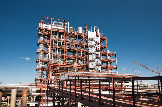Computer process simulators (CPS) and industrial safety
Recent trend of capacity increase and production facilities intensification including explosion and fire hazardous plants which lead to growth of failure cost of operating personnel makes the problem of highly efficient personal training more acute and significant.
We believe that training staff to operate complicated production units, in particular urea production units is a very important aspect due to different reasons. Among the most important are requirements for production unit safety and its economic efficiency improvement.
It is common knowledge that implementation of modern APCSs and control quality improvement reduces number of start ups/failures and emergencies at production facilities. But in its turn, it reduces operators’ skills’ level to act in emergency situations.
The systematic approach to personal training and its professional level maintenance is becoming more acute.
CPS — is the most effective way of personnel training (retraining) which provides quality improvement of personnel education through all modern multimedia means.
Unlike other companies NIIK pays attention to each specific activity being a part of any educational process. Functional structure of CPS consists of:
theoretical part (electronic documentations representing process knowledge base)
- testing part (theoretical knowledge testing)
- practical part (providing acquiring and mastering of practical skills)
- evaluation part (practical skills are assessed in simulation conditions of different modes, including failure and emergency situations)
Our work typically revolves around the development of simulation models for urea production facilities, but setting our attention in a solution-focused style to support and accompany our clients, we are able to build the simulator model for any chemical facility on the basis of plant design data and best-estimate calculations.
Computer process simulators designed by NIIK have been implemented in the following plants:

